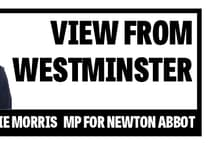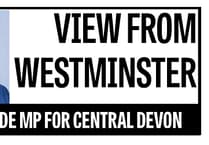THIS year I took part in services of remembrance in Kingsteignton and Dawlish. In the morning I marched with the Royal British Legion, community groups and many residents to St Michael’s church, and then on to lay a wreath at the memorial to the fallen. In the afternoon I did the same, marching with the community in Dawlish to St Gregory’s. In Parliament I also laid a cross on behalf of the constituency, remembering all who gave their lives across Teignbridge.
It is important that we honour and recognise those who have served our country.
Security of the nation is the first duty of government. Ukraine has demonstrated very clearly that war is still with us today. Digital Defence has become critically important. How we communicate by land, air, and sea is key to our nation’s security.
Last week, as a member of the Public Accounts Committee, I led an inquiry into how across government, and more specifically in the Ministry of Defence, an appropriate digital strategy and plan is being put in place to keep us safe, and ensure those on the front-line are well equipped and supported.
On Thursday, the Chancellor had to deliver some hard messages in the Autumn Statement. He needed to kick start our economy, drive growth, and put in place measures to help both individuals and businesses survive and succeed in these challenging times. The question is whether these measures will deliver that.
For individuals there was the welcome continuation of the Energy Price Guarantee. Albeit at a higher cap of £3,000, the continuation of the scheme means that an average of £500 support for every household is made available. Those who use alternative fuels will also receive £200 of support, double what it was. And the most vulnerable in our society will receive additional cost of living payments next year. Benefits will be uprated by inflation and the benefit cap raised. Pensioners will be pleased the Chancellor honoured our manifesto commitment to retain the Triple Lock. For those in work, the National Living Wage will also rise.
However, with tax thresholds frozen (and at the top tax rate, dropped), many will find themselves paying more income tax as their salaries rise with inflation. Inheritance tax and Capital Gains Tax will also be more costly as tax free allowances are frozen or reduced.
So, the jury is out as to whether this will be enough help for those in work but not on benefits to manage, and for those on fixed incomes to make ends meet. This will depend on what actually happens to inflation, interest rates and energy prices. These changes in capital taxes are expected to slow the property market.
Businesses will have the business rates burden reduced, as the government will be providing £13.6bn of support over the next 5 years. The majority of this support will come in the form of business rates multipliers being frozen, and those in retail, leisure and hospitality will benefit from an increase in rate relief of up to 75% to a maximum of £110,000 per business. However, this has to be set against the increasing burden of Corporation Tax as it goes up to the higher rate of 25%. Employers will also have to afford the new minimum wage within their tightened budgets. But key to growth will be the willingness of individuals and businesses to invest. Whether that investment continues will be the acid test for this budget’s success.
Public Service budgets will be subject to efficiency reviews, but the NHS and education will receive a welcome boost in their funding. The £2.8bn being made available in 2023-24 and the £4.7bn in 2024-25 to the NHS is most welcome.
The Chancellor for now has the benefit of the doubt, but if the increasing tax burden and reduction in government expenditure dampens growth – the Chancellor will have to think again.
As always, if you would like to book a surgery appointment (in-person or virtual) or raise a specific issue, please call my office on 01626 368277 or email [email protected] to arrange an appointment.




